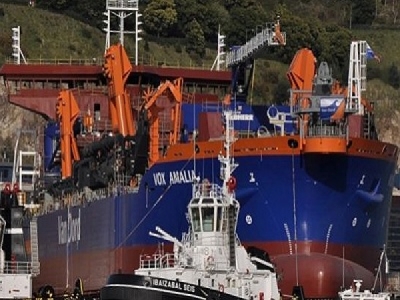
Posted on January 9, 2019
Dutch dredging giant Van Oord closed out celebrations marking its 150th anniversary year with the christening last month of the trailing suction hopper dredger ‘Vox Amalia’ in Rotterdam.
Dredging has a high profile in public life in the Netherlands and Her Majesty Queen Maxima was on hand to swing champagne towards a vessel named after her daughter in front of some 1,400 Van Oord employees and guests. Queen Maxima toured the vessel and met its crew and also spoke to the engineers who had supervised its construction the LaNaval shipyard in Bilbao, Spain. She also spoke to a group of young people representing ‘Generation Z’, the offspring of employees and shareholders, who shared their ideas about a sustainable future.
Vox Amalia is 158m long, 36m wide and has a hopper capacity of 18,000 m3. It spearheads a new generation of dredgers with low fuel consumption and CO2 emissions. Three main engines instead of the traditional two make it easier to match energy supply with demand during various operational modes.
The vessel is designed for capital dredging, coastal works and the dredging of trenches for pipes and cable routes for offshore installations such as wind farms. It features twin suction pipes with with submerged electrically driven dredge pumps and two shore discharge dredge pumps.
Meanwhile, Van Oord, in a consortium with the DEME Group’s Dredging International, has been awarded a major contract for the modernisation of the Swinoujscie – Szczecin fairway in Poland. The contract covers the deepening and widening of the fairway along a distance of some 62 km.
The investment by the Maritime Office in Szczecin will improve access to the Szczecin seaport and increase port capacity to handle a growing volume of cargo.
Dredged materials from the design and build contract will be used to build two artificial islands in the Szczecin lagoon. The works also include enforcements of slopes and quay walls along the channel, and the relocation of cables and navigational aids. Environmental sustainability and cooperation among all project stakeholders will play a key role during project execution.
Works were due to start at the end of 2018 and are expected to be completed within 42 months. The contract is valued at some €313 million and is being co-financed by the European Union.
Source: MJ





